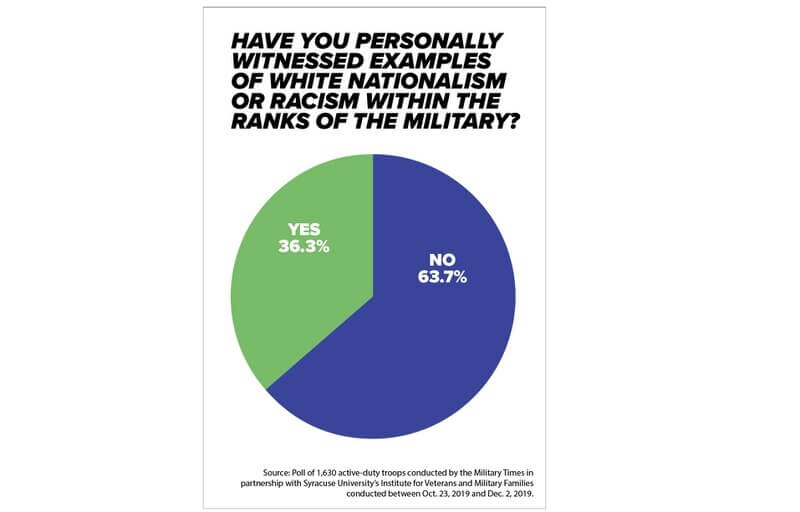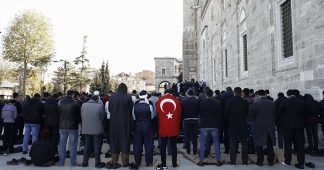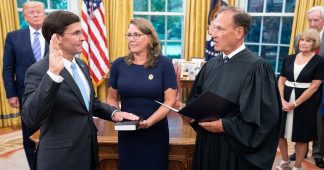February 6, 2020
More than one-third of all active-duty troops and more than half of minority service members say they have personally witnessed examples of white nationalism or ideological-driven racism within the ranks in recent months, according to the latest survey of active-duty Military Times readers.
The poll surveyed 1,630 active-duty Military Times subscribers last fall on their views about political leaders, global threats and domestic policy priorities. It offers a troubling snapshot of troops’ exposure to extremist views while serving despite efforts from military leaders to promote diversity and respect for all races.
The 2019 survey found that 36 percent of troops who responded have seen evidence of white supremacist and racist ideologies in the military, a significant rise from the year before, when only 22 percent — about 1 in 5 — reported the same in the 2018 poll.
Enlisted members were more likely than officers to witness the extremist views (37 percent to 27 percent). Minorities were significantly more likely to report cases of racist behavior than whites (53 percent to 30 percent).
Overall, troops who responded to the poll cited white nationalists as a greater national security threat than both domestic terrorism with a connection to Islam, as well as immigration.
Poll participants reported witnessing incidents including racist language and discriminatory attitudes from peers, but also more specific examples like swastikas being drawn on service members’ cars, tattoos affiliated with white supremacist groups, stickers supporting the Ku Klux Klan and Nazi-style salutes between individuals.
“We had a fellow recruit detained and thrown out of my bootcamp platoon due to Nazi tattoos and questionable statements,” wrote one poll participant. “The majority of my co-workers were absolutely outstanding regarding race and work-relations and I credit military service for that. Nevertheless, somehow more racists are slipping through the cracks into the military.”
White supremacists in the ranks
Cassie Miller, a research and investigations specialist for the Southern Poverty Law Center, said the Military Times poll findings should not come as a surprise.
“Historically, this has been a problem for the military,” she said in an interview. “We’ve been pushing the Defense Department to take this issue more seriously since 1986. There are certain parts of the white power movement that value military experience and are often recruiting there.”
Miller said the problem has grown in recent years as groups with goals advocating violent insurrection have begun pushing more extremist agendas.
Earlier this month, an Army veteran and member of a neo-Nazi group was charged with trying to illegally transport weapons along with a Canadian Army reservist into Virginia for a gun rights rally. The former soldier was identified as a member of The Base, a small militant group espousing Adolf Hitler’s ideals while preparing for a race war in America as part of its ideology.
Last fall, the names of several service members, veterans and potential military recruits were found among users of the neo-Nazi forum Iron March after activists leaked an internal database connected to the group. Around the same time, Army investigators opened an inquiry into a Reserve operations officer in connection with racist, anti-government screeds calling for extreme violence he allegedly posted online. That investigation is still ongoing.
The Army National Guard kicked out two soldiers in December after activists uncovered their membership in a religious group with white supremacist ties. Defense Department officials tracked at least 27 reports of extremist activity by active-duty troops from 2013 to 2018.
“We’re seen groups encouraging members to join the military, to get training in weaponry and survival skills,” Miller said. “It’s something that they really value.
“We also know that hate groups and white supremacy groups are actively recruiting military members. If they want to use violence to push the country into a race war, they need people with a knowledge of firearms, explosives and other military skills.”
/arc-anglerfish-arc2-prod-mco.s3.amazonaws.com/public/HYL4QZLQPZCZ5C5XAPGKIBR4NY.png)
Congressional response
House Armed Services Committee members will hold a hearing on the issue next Tuesday titled “Alarming incidents of white supremacy in the military — how to stop it?” The event will feature outside specialists in extremist ideology and military officials charged with monitoring such activity.
In response to concerns about growing extremist views in the military, lawmakers last year passed a law requiring the Pentagon to revise command climate surveys of troops to include questions on whether individuals have seen “extremist activity” in the workplace.
Rep. Anthony Brown, a Democrat from Maryland, helped write those provisions into law and referenced past Military Times poll results on the issue as an impetus for further investigation into the problem. He called the latest poll results upsetting.
“I’m alarmed and troubled by those numbers, but in some ways I’m also not surprised,” he said. “This is consistent with what I’m hearing when I speak to soldiers, sailors, Marines and airmen. They’ve told me anecdotally about racism they see, white nationalist language, signs and symbols.”
Brown, whose Army career included a deployment to Iraq, said he expects the climate survey questions to put additional emphasis on the issue, hopefully bringing awareness to military leaders about problems within units that have gone undetected by leadership.
“I continue to believe the U.S. armed forces are a real model for diversity and inclusion, and a place of opportunity for men and women of all races,” he said. “But there are still obstacles, and we have to look to continue to make improvements.”
Lawmakers also included language in the annual budget policy bill mandating a study into new ways to screen and identify recruits with racist or extremist views, to include coordination with the FBI and outside experts monitoring hate groups. That report is due this summer.
In the poll, about 46 percent of troops surveyed rated white nationalists as a significant national security threat, slightly higher than domestic terrorists with a connection to Islam (45 percent), and significantly above immigrants (28 percent).
Slightly less than 2 percent of poll respondents offered unprompted comments that black-on-white racism is a bigger problem facing the military than white nationalist groups, or that reports of white supremacist viewpoints in the military is only a media hoax.
/arc-anglerfish-arc2-prod-mco.s3.amazonaws.com/public/VF4X63F74JCUJOH2X5FGQ45L64.png)
** Our methodology
Between Oct. 23 and Dec. 2, Military Times in collaboration with the Institute for Veterans and Military Families (IVMF) at Syracuse University conducted a voluntary, confidential online survey of U.S. service members. Poll participants are readers of Military Times publications whose military status is verified through official Defense Department email addresses.
The survey included 28 questions on service members’ opinions related to the current political climate, policy and national security in the United States.
The survey received 1,630 responses from active-duty troops. The IVMF used standard methodology to estimate the weights for each individual observation of the survey sample. The margin of error for most questions was roughly 2 percent.
Like most studies where participation is voluntary, the poll’s sample is subject to self-selection bias. Researchers took effort to account for that and adhered to generally accepted scientific practices analyzing the data.
The survey audience was 92 percent male and 8 percent female. The respondents identified themselves as 75 percent white, 14 percent Hispanic, 13 percent African American, 5 percent Asian and 5 percent other ethnicities. Respondents could select more than one race.
* Leo Shane III covers Congress, Veterans Affairs and the White House for Military Times. He has covered Washington, D.C. since 2004, focusing on military personnel and veterans policies. His work has earned numerous honors, including a 2009 Polk award, a 2010 National Headliner Award, the IAVA Leadership in Journalism award and the VFW News Media award.
Published at www.militarytimes.com












